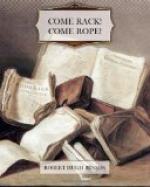Then he went to his door, unbolted it, and walked downstairs to find the landlord.
III
It was not until ten days later, soon after dawn, that Robin set out on his melancholy errand. He rode out northward as soon as the gates were opened, with young “Mr. Arnold,” a priest ordained with him in Rheims, and one of his party, disguised as a servant, following him on a pack-horse with the luggage. It was a misty morning, white and cheerless, with the early fog that had drifted up from the river. Last night the news had come in that Anthony and at least one other had been taken near Harrow, in disguise, and the streets had been full of riotous rejoicing over the capture.
He had thought it more prudent to wait till after receiving the news, which he so much dreaded, lest haste should bring suspicion on himself, and the message that he carried; since for him, too, to disappear at once would have meant an almost inevitable association of him with the party of plotters; but it had been a hard time to pass through. Early in the morning, after Anthony’s flight, he had awakened to hear a rapping upon the inn door, and, peeping from his window, had seen a couple of plainly dressed men waiting for admittance; but after that he had seen no more of them. He had deliberately refrained from speaking with the landlord, except to remark again upon the luggage of which he caught a sight, piled no longer in the entrance, but in the little room that the man himself used. The landlord had said shortly that it had not yet been sent for. And the greater part of the day—after he had told the companions that had come with him from Rheims that he had had a letter, which seemed to show that the party with whom they had made friends had disappeared, and were probably under suspicion, and had made the necessary arrangements for his own departure with young Mr. Arnold—he spent in walking abroad as usual. The days that followed had been bitter and heavy. He had liked neither to stop within doors nor to go abroad, since the one course might arouse inquiry and the second lead to his identification. He had gone to my Lord Vaux’s house again and again, with his friend and without him; he had learned of the details of Anthony’s capture, though he had not dared even to attempt to get speech with him; and, further, that unless the rest of the men were caught, it would not be easy to prove anything against him. One thing, therefore, he prayed for with all his heart—that the rest might yet escape. He told his party something of the course of events, but not too much. On the Sunday that intervened he went to hear mass in Fetter Lane, where numbers of Catholics resorted; and there, piece by piece, learned more of the plot than even Anthony had told him.




